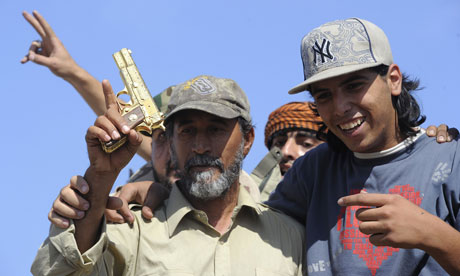Though the question how Muammar Qaddafi was killed has remained vague and blurred. Was he killed by rebellions after he was arrested or stuck in crossfire and perverted bullets hit his chest and head? But there is a certainty: Libyans got rid of an iron-fist dictator who was breathtakingly suppressing every opposing sound and never let people to voice anger, irritation and opposition to government programs and policies. And if any one dared to oppose was terribly punished and reprimanded. Political dissents were executed in the country and even those activists out of the country were not safe - government elements targeted them across the world.
During his 41-years-long rule over the country, he never allowed any opposing sounds raise and change into a national-wide uprising. Though he tried to pretend to have held measures for loosening grip over the country through establishment and supporting local councils, but it was clear there was no force in the country to challenge his might.
In the field of foreign policy, his regime's overall relation with western countries, particularly US, did not go on smooth track. It was dominated by suspicion and dubiousness after he rose to power through a military coup in 1969. He was blamed for financial are arm support to North Irish separatists troops and Abu Sayyaf Islamist militants in Philippine. It got further tense after the explosion of civil US aircraft over Scotland for which Tripoli was blamed.
But recently, he held measures that were signs of decision to restore relation with western countries. In 2003, he suspended nuclear program and took a tough stance against Iran's Uranium Enrichment Programme, as he once severely criticized the theocratic regime and said that Iran's behavior against West was belligerent.
The measures indeed fuelled a warmer relation with western countries. Meanwhile, European companies too were attracted to the country after revelation of large natural reserves. Multi-national companies invested in billions to the country which prospered a small layer of society who had linkage with the regime.
The process led to further tightening of relation. Because nowadays the political establishment have close links with the economy. Indeed this is the economy that shapes the politics, particularly foreign policies. As Wikileaks website released data shown how American diplomats were engaged in bargaining with countries to buy American aircrafts.
In addition, one of the fundamental questions that remained unanswered in the case of Libya was why the United Nation Security Council in such a hasty move passed no-fly zone over Libya? Why NATO members supported rebellions to hit Muammar Qaddafi's regime? There were reports that some European countries like France equipped rebellions and sent troops to train them. The question still circulates why European countries have acted differently with countries with similar sufferings---dictatorship and economic problem?
They have not done anything in the case of Syria, Yemen and Bahrain where human casualties surpass that of Libyan's. So, why they have not?
After the approval of no-fly zone over Libya, there were sharp criticisms against NATO's double actions. Meanwhile, there were supporters too, arguing that if international community was unable to handle crisis in the rest of the world, it does not mean it should deal with crisis it can and have the capacity.
Many experts are in view that all military actions against countries like Yemen and Syria would be counterproductive, and weaken the ongoing Arab civil uprising. They fear that military actions, on one hand, fuel insurgency and strengthen Islamic radicals, on the other hand, rise human casualties because Yemen and Syria are not Libya. They have strong military establishment comparatively, and air strikes would not prove as efficient as they did in the case of Libya. NATO is not in position to finance a long-term war presently. The Untied States have large economic problems at home and it cannot finance another war.
The situation of European countries is not better. During Libya's mission, members came to understand how insufficient their military budget is. Without the United States, they are unable to fund a war. The former defense minister, Mr. Robert Gates, during his incumbency severely lashed out European allies for declining military budget and forcing USA to shoulder problems unilaterally.
But meanwhile, there were criticism that NATO actually wanted to appoint a western-friendly government and challenge China's growing influence there. Seemingly, Chinese companies have largely invested in Libya, particularly in oil and mineral reserves. If the situation was going in the same process, Chinese companies would have won over.
Anyhow, whatever were the reasons behind, now NATO members have announced to withdraw from the country and let transitional government to deal with problems unilaterally. There would be Qaddafi anymore. He would appear hereafter on pages of history text books.
But there is still one thing that will affect Arab countries---his death. Arab uprising that started from Tunisia and passed through Egypt easily has counter major stumbling-block in Libya, Syria, Yemen and Bahrain. With his death, indeed, one of the major challenges has been washed away.
Though country would be considered closely by international community and countries with large economic interest to not let move against what people initially stood for and made large sacrifices, but there no doubt the challenge settled down and there is no need of costly military engagement. His death provided them to breathe and consider measures against other problems challenge the Arab democratic uprising.
Indeed, they have the opportunity to mount pressure on authoritarian regimes to respond to civilians' calls for freedom and liberty. In addition, it the situation moves on smooth track towards democracy, the anti-military actions would weaken too. And NATO will have a dominant position at bargains with Russia and China to support tough resolutions.

